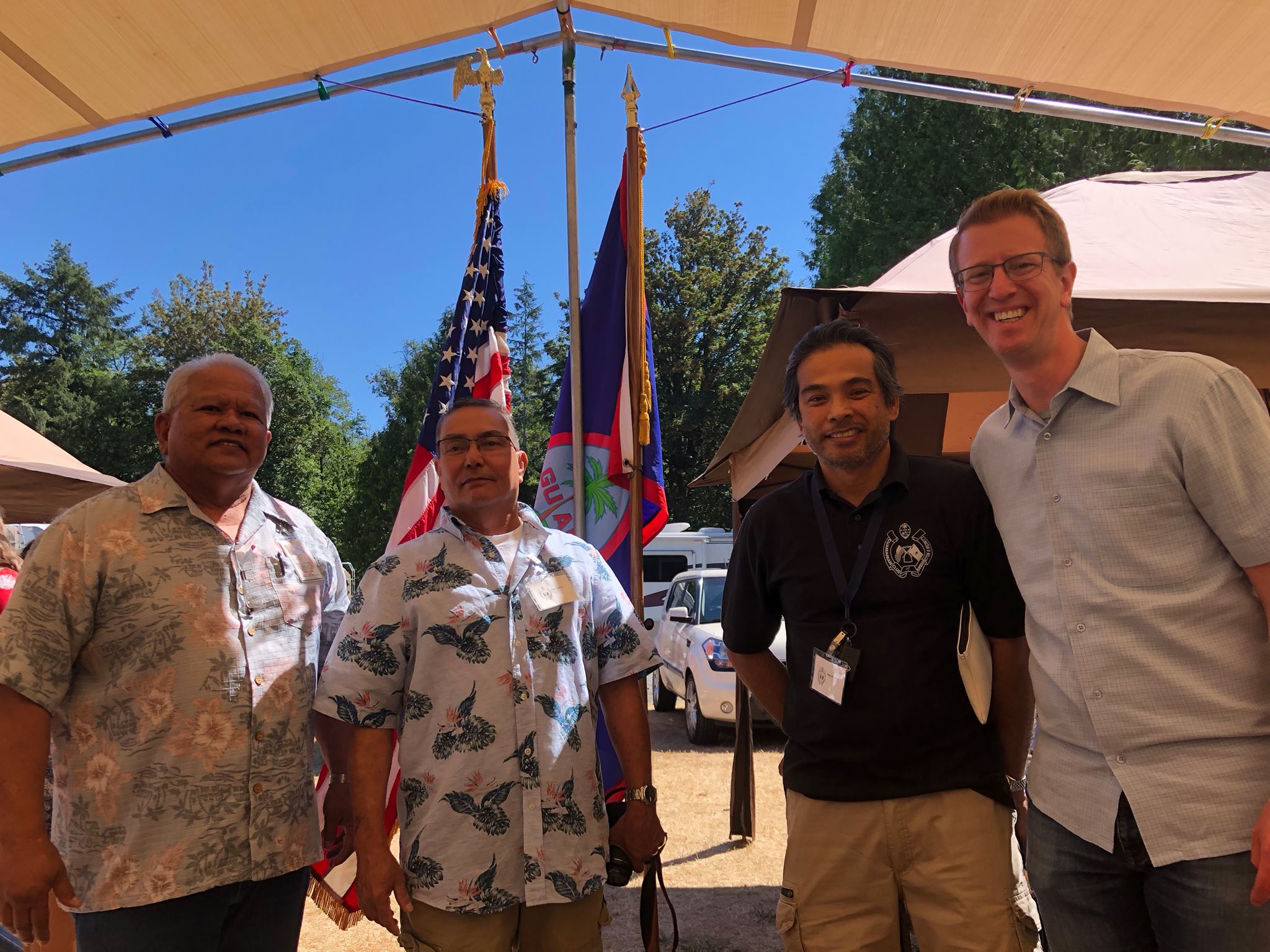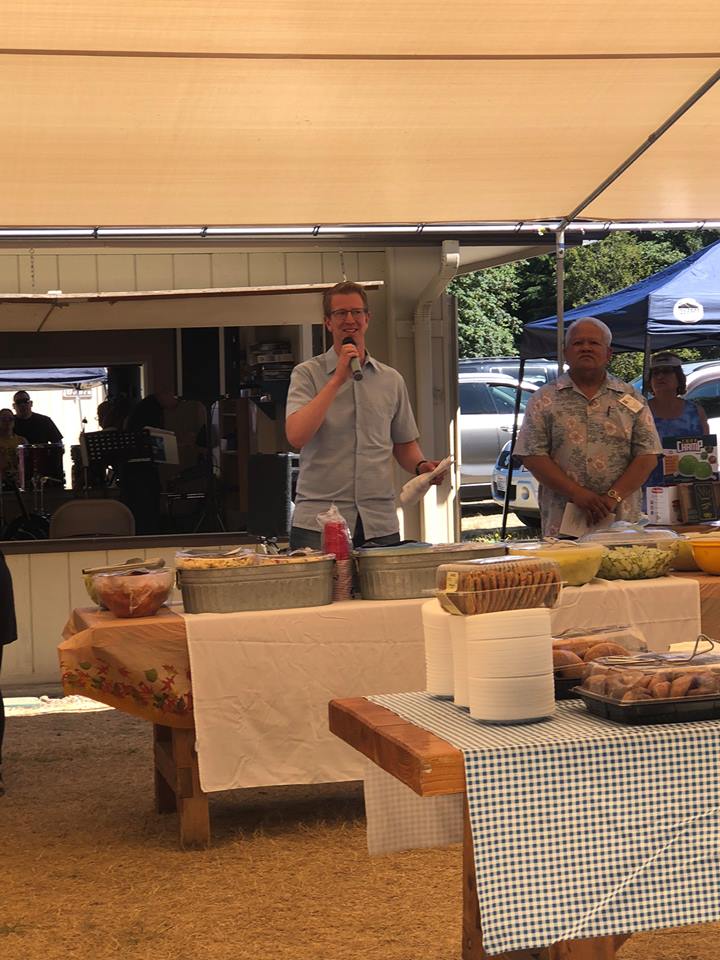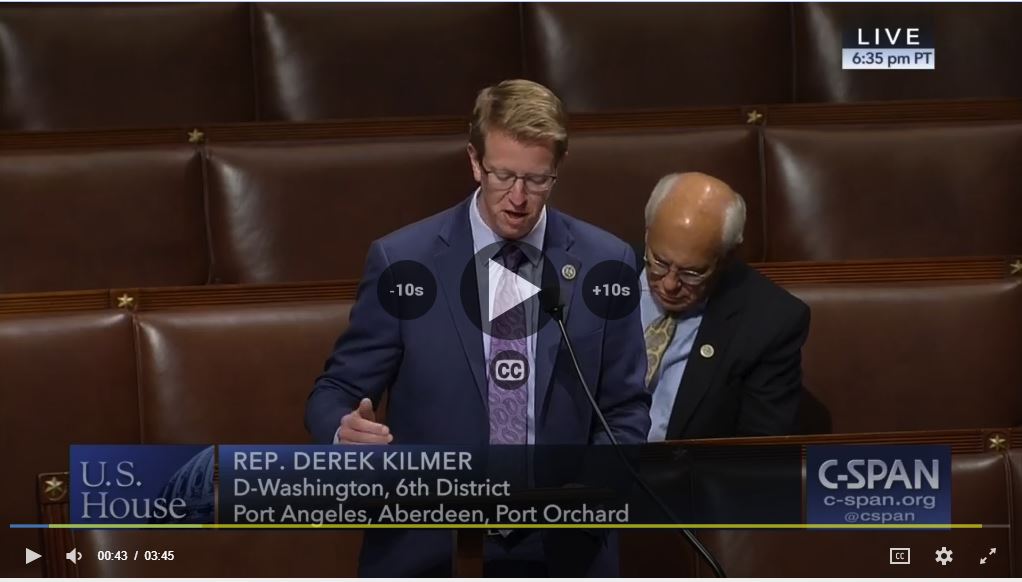Breaking Through the Gridlock
As we head into August, the US House is heading into “recess.” But unlike my daughters’ schools, my recess isn’t going to involve much playtime. In the month ahead, I’ll be traveling all over our region – from downtown Tacoma to Neah Bay, from Ocean Shores to Bainbridge Island, and all points in between. I’ll be visiting local employers, working on local projects to support job growth, and meeting with constituents. Keep an eye out for me at your favorite fair or festival – I’ll likely be the guy with the fried food in my hand.
A lot has happened since my last note. Here is the latest.
Breaking through the gridlock
When I was first elected to the House, I joked all the time that it was going to be a fixer-upper. Since then, I’ve learned that it’s worse than I thought. The House of Representatives – the people’s House – is badly in need of a full renovation.
When renovating a house, you don’t just diagnose the problems like water in the basement or an outlet that doesn’t work. You fix the structural flaws causing those problems – like the plumbing or the electrical system.
In recent years, Congress has had too much partisan bickering and far too little progress.
The American people deserve a functioning Congress where the citizens have a say, debate happens, and the peoples’ work gets done.
I’ve come to believe that real change in Congress requires structural reforms. Congress needs to change how it does business so that representatives spend less time finger-pointing and more time consensus-building. Right now, power is concentrated at the top, there’s a lack of debate on important bills that have long-term consequences (e.g., the tax bill), and the rules seem to be rigged in favor of special interests and deep-pocketed donors.
The American people deserve better.
That’s why, over the last few months, I worked with a group of Democrats and Republicans to draft a plan to “Break the Gridlock.” Our plan makes a few recommendations that I think are a great start to fixing up the House.
Most importantly, it would lead to more debate on the floor of Congress, and more opportunities for both parties to bring legislation up for an actual vote.
You can read the plan to “Break the Gridlock” here.
Heads up: it’s a little wonky. I’d also encourage you to check out this article about it in The New York Times as well.
It seems that every couple of years, folks in DC promise to clean house. That’s no longer good enough. Regardless of which party controls Congress, voters should demand that their leaders are committed to renovating the house. Our nation must tackle the challenges we are facing head on so that public trust is restored.
Working across the aisle to support our military and civilian defense workers
Despite the gridlock, in the last few days, I was able to get some important things done.
First, if you’re a regular reader of this newsletter, you may have seen a few weeks back that the bill that authorizes spending for the Defense Department, the National Defense Authorization Act for 2019, passed through the House with some important policies for our region. In the weeks since, a different version of the bill passed in the Senate.
This week, a bipartisan group of Senators and Representatives (called the Conference Committee) ironed out the differences between the two bills into what’s called a Conference Report – a fancy word for final draft. The version includes something for which I’ve been fighting since 2015 – a permanent repeal of a lousy policy which caused shipyard workers and other defense employees to spend more money out of their own pockets when they’re on work-travel fixing up our ships around the world. This change in per diem policy has been a real headache for our local defense installations and the men and women who work there.
I worked hard with a bipartisan group of lawmakers in the years since these per diem reductions were implemented in hopes of keeping these changes from going into effect.
This year, I’m happy to tell you we successfully repealed the policy permanently! This is a big deal – for our defense workers, local hotels and restaurants, and for the US Navy’s readiness.
The final draft of the NDAA also includes an extension of a measure I’ve fought for which ensures that the shipyard workers make overtime when they work overtime while servicing and maintaining our fleet overseas. It seems weird that it takes an act of Congress to make sure that people get paid overtime when they work overtime. But it did! These men and women are keeping the Navy afloat in the busiest waterways in the world; they’re not going on vacation. When they work overtime, they ought to be paid for it.
I understand the urgent need for Congress to address America’s fiscal challenges, but nickel-and-diming federal workers isn’t the way to go. I’m going to keep pushing for our region.
Secondly, the House passed a bill I co-introduced with Representative Ryan Costello, a Republican from Pennsylvania, to support America’s servicemembers. Under a law called the Servicemembers Civil Relief Act, those who serve in our military have some important financial protections to make sure that they don’t face unnecessary financial burdens when they are deployed. Our bipartisan bill would expand that law to allow servicemembers to suspend their cable or internet contract when they get deployed.
We’re lucky to have so many active duty members of the military as our neighbors in the region. When they are about to deploy or answer our country’s call to move somewhere else, they shouldn’t have to spend time before they ship out on the phone with customer service. They shouldn’t have to worry about bills piling up while they’re gone. They should simply be able to show their orders and have things taken care of.
Senator Maria Cantwell introduced the bipartisan companion bill in the Senate, where it needs to pass next before it can become a law. I’ll keep you posted on how that goes.

Protecting America’s Crown Jewels
I also broke some gridlock this week with the Republicans and Democrats serving on the House Natural Resources Committee. Last year, I introduced a bipartisan bill called the National Park Service Legacy Act, which provides funds to address the $11 billion maintenance backlog in the National Park System.
Our national parks, in addition to being beloved by every American, are key drivers of local economies. They’re America’s crown jewels … but they’re getting a little rusty.
Record numbers of families, campers, and adventurers are spending time each year exploring these iconic landscapes. That’s put strains on many of the roads visitors drive on, the centers that provide history, and the trails themselves. As a consequence, we’ve seen trails and roads washed out. We’ve seen visitors’ centers in various states of disrepair. Our parks are being “loved to death.”
In an effort to do something about this, I’ve spent months negotiating with Republicans and Democrats in the House and Senate. And this week, I helped introduce a new bill with the members of the House Committee on Natural Resources that brings things one step closer to getting passed. It’s called the Restore our Parks and Public Lands Act.
The bill proposes using existing government revenues to fund the maintenance backlog.
For every $1 Congress spends to fund the National Park Service, America sees $10 in economic benefits. On the Olympic Peninsula and throughout the state, national parks support thousands of jobs and businesses. The state’s outdoor economy supports 201,000 direct jobs and generates $26.2 billion in consumer spending in our state.
And it matters on an individual level. When I take my daughters hiking, we want to be able to fill up our water bottles at the Hoh Rainforest Visitors Center before we set out to see one of the most amazing places on Earth.
That’s why it’s so important for Congress to step up and get this done.

I am also hopeful this momentum will produce a path towards full reauthorization of the Land and Water Conservation Fund, which is another invaluable tool that supports our Parks and Public Lands. I recently spoke about this on the House floor.
Lastly, while we’re on the topic of water. I have to bring up an issue that legitimately stinks…
For decades, our neighbors to the north in Victoria, British Columbia have been dumping raw sewage into our shared waters. Between NIMBYism and lack of funding, they had failed to address a situation which has been – in a word – gross.
Over the last few years, I’ve been working to get this addressed. I’ve added language into Appropriations bills. I’ve raised concerns with people at the highest levels of the US and Canadian government. I even personally raised a stink about this with Prime Minister Justin Trudeau when he visited in 2016. And he listened!
Following his visit, the Canadian government provided financial support for a new sewage plan that’s expected to be built by 2020.
This week Q13 posted an update on the efforts, and the project appears to be going smoothly!
While I couldn’t resist some jokes, this is actually a big win for our region’s environment, economy and identity. Human pollution flowing into our shared waters threatens everything from the endangered Southern Resident Killer Whales that call our region home, to the health of mussels that support jobs throughout our region.
So, I’ll keep pushing until this gets done.
Working for you
Tess and I were recently in Bremerton and celebrated Guam Liberation Day. It was a terrific celebration of freedom, heritage, and all of the brave people who serve. Many thanks to the Guamanian Club and all of the veterans in attendance!

My daughter and I also had a blast at the Allyn Geoduck Festival. Tess and I got to emcee the oyster shucking contest (and posed with a variety of shellfish throughout the day). Thanks to everyone who participated!

That’s it for now! Bonus points if you made it all the way through to the end.
I’m looking forward to seeing you throughout the region this month! And, as always, I’m honored to represent you!
Sincerely,
Derek

